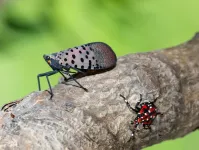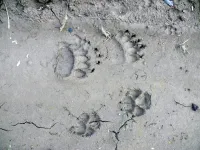(Press-News.org) Having trouble coping with COVID?
Go take a hike. Literally.
Researchers have long been aware of the positive impact of a connection with nature on psychological health and, according to a new study published in the journal Personality and Individual Differences, the pandemic hasn't decreased the power of nature to improve mental well-being.
"Thinking about the natural world in an interconnected and harmonious way corresponds to improved psychological health, no matter where you are," says Brian W. Haas, the lead author of the new study and an associate professor in the Behavioral and Brain Sciences Program at the University of Georgia.
Haas and his collaborators - Fumiko Hoeft, a professor of psychological sciences at UConn and director of UConn's Brain Imaging Research Center; and Kazufumi Omura, faculty of Education, Art and Science at Yamagata University in Japan - used a survey in America and Japan to measure worldviews on nature as well as how much the pandemic impacted people's lives, and their current psychological health.
The survey sought to gauge whether the participants had a worldview in harmony with nature - being in tune or connected with the natural world, or a worldview of mastery over nature - the belief that people have the ability to control the natural world. They also reported on their stress levels and were asked if the COVID-19 pandemic has affected them personally or impacted their employment or finances.
The researchers found that, while participants in general report greater stress levels during the pandemic, individuals with a harmony-with-nature worldview were coping better regardless of whether they lived in Japan or in the United States.
"Clearly there's great need for study as relates to the pandemic, not just now during COVID, but also of previous pandemics and for possible future pandemics," says Hoeft. "I feel like this is a really great lesson, and a moment for us to really appreciate that things like our relationship with nature do matter and make an impact on more tangible things, like our mental health, which we often forget."
The researchers found that the difference between the two cultures, however, became apparent when looking at individuals with a mastery-over-nature worldview.
"We found that the Americans who believed that humans are, and should be, the masters of the natural world did not tend to cope well during the pandemic," Haas says. "While this was not the case in Japan."
Rather, in Japan, having a mastery-over-nature worldview was not correlated with poor coping. The researchers suggest the difference might be rooted in the concept of naïve dialecticism - the acceptance or tolerance of contradiction.
"In other cultures outside of the United States, people tend to be more comfortable with contradiction; in other cultures, it is generally more accepted to possess conflicting ideas within your mind at the same time," Haas says. "But in the United States, it's not. We can apply this concept to nature and the current global pandemic. For instance, if I hold a view that I am the master of the natural world, and then a global pandemic happens, this is a clear natural disaster. If I believe that I am the master of the natural world, then surely I would never allow a natural disaster to happen. These concepts are inconsistent with one another, and a consequence of inconsistency is often negative mood."
While the study offers only a snapshot view of just two cultures, Haas believes other cultures would likely demonstrate a similar positive association with a harmony-with-nature worldviews, predicting that "it's likely a universal phenomenon."
Both Haas and Hoeft say that, in an increasingly virtual and technology driven world, taking a moment to appreciate nature has clear benefits regardless of where you live.
"In Japanese, there's this word called 'forest-bathing,'" Hoeft says. "It's basically when you go out into nature, and enjoy being surrounded by trees. It's usually for forests, but you go walking and it's supposed to refresh you. People often talk about how they went out 'forest bathing.' I love thinking about these kinds of old phrases - do they have some real impact or real scientific background in the end? And I think this is one of them where this really does have a connection. There is some scientific truth behind this."
"Think about taking a step away from Zoom for a moment and taking a walk and listening to the birds chirp," Haas says. "I mean, just the benefit of that, and understanding that we have a role in this natural world, and we're part of it. I think that's really intuitive and it's obvious, but I think it's also really, really important. We're showing very convincingly with empirical data that, during a very difficult time like we are in now, that it's important to do these things to maintain your psychological health."
INFORMATION:
This study was supported with funding from a Global Research Collaboration Grant from the University of Georgia and a National Science Foundation grant, NSF #202937.
Almost 100 years ago, a revolutionary discovery was made in the field of physics: microscopic matter exhibits wave properties. Over the decades, more and more precise experiments have been used to measure the wave properties of electrons in particular. These experiments were mostly based on spectroscopic analysis of the hydrogen atom and they enabled verifying the accuracy of the quantum theory of the electron.
For heavy elementary particles - for example protons - and nuclides (atomic nuclei), it is difficult to measure their wave properties accurately. In principle, however, these properties can be seen everywhere. In molecules, the wave properties ...
An international team of researchers has developed a framework for assessing brand reputation in real time and over time, and built a tool for implementing the framework. In a proof of concept demonstration looking at leading brands, the researchers found that changes in a given brand's stock shares reflected real-time changes in the brand's reputation.
"We've developed something we call the Brand Reputation Tracker that mines social media text on Twitter and uses 11 different measures to give us an in-depth understanding of how users feel about individual brands," says Bill Rand, co-lead author of the paper and an associate professor of marketing in North Carolina State University's Poole College of Management.
The Brand Reputation Tracker ...
Evidence that a sense of our physical selves can develop even without the sense of touch has been uncovered in a new study by researchers in the UK and the United States.
The research shows that if someone loses their sense of touch and 'proprioception' - their sense of body position - as an adult, they may learn compensatory skills using visual cues and conscious thought, or reasoning, to move their bodies.
Someone who has never had a sense of touch or proprioception, however, can find faster, unconscious ways of processing visual cues to move and orient themselves.
A team at the University of Birmingham collaborated with researchers at Bournemouth University and the University of Chicago on the study, ...
In the late 1980s and 1990s, researchers at ETH Zurich discovered the first indications that the amount of sunlight reaching the Earth's surface had been steadily declining since the 1950s. The phenomenon was known as "global dimming". However, a reversal in this trend became discernible in the late 1980s. The atmosphere brightened again at many locations and surface solar radiation increased.
"In previous studies, we showed that the amount of sunlight that reaches the Earth's surface is not constant over many decades but instead varies substantially - a phenomenon known as global dimming and brightening," ...
Researchers from Rutgers Cancer Institute of New Jersey, the state's only National Cancer Institute-designated Comprehensive Cancer Center, evaluated the frequency of SARS-CoV-2, the virus that causes COVID-19, on various environmental surfaces in outpatient and inpatient hematology/oncology settings located within Rutgers Cancer Institute and Robert Wood Johnson University Hospital, an RWJBarnabas Health facility. The study revealed extremely low detection of SARS-CoV-2 on environmental surfaces across multiple outpatient and inpatient oncology areas, including an active COVID-19 floor. Andrew M. Evens, DO, MSc, FACP, associate director for clinical services and director of the Lymphoma Program at Rutgers Cancer Institute and medical director of the oncology service ...
Annapolis, MD; February 17, 2021--When the invasive spotted lanternfly arrived in the United States in 2014, it was immediately recognized for the threat it posed to native plants and crops. A community of researchers and experts in science, agriculture, and government sprang into action to respond, improving our chances for containing the pest and curbing its potential for damage.
While the effort continues, a new collection curated by the Entomological Society of America's family of journals showcases the growing body of research that is helping us understand the spotted lanternfly's biology and how to contain it. The collection features 25 articles published ...
When there is a choice, wolves in Mongolia prefer to feed on wild animals rather than grazing livestock. This is the discovery by a research team from the University of Göttingen and the Senckenberg Museum Görlitz. Previous studies had shown that the diet of wolves in inland Central Asia consists mainly of grazing livestock, which could lead to increasing conflict between nomadic livestock herders and wild predatory animals like wolves. The study has been published in the journal Mammalian Biology.
Around three million people live in Mongolia, making it the most sparsely populated country in the world. In addition, there are more than 40 million grazing animals. These animals are not just a source of food but also the ...
By 2030 only EV's will be in production, meaning manufacturers are racing to create a high-energy battery that's affordable and charges efficiently, but conventional battery cathodes cannot reach the targets of 500Wh/Kg
Lithium-excess cathodes offer the ability to reach 500Wh/Kg but unlocking their full capacity means understanding how they can store charge at high voltages.
A new X-ray study lead by WMG, University of Warwick has resolved how the metals and oxygen facilitate the charge storage at high voltages.
High energy storage batteries for EVs need high capacity battery cathodes. New lithium-excess magnesium-rich cathodes are expected to replace existing nickel-rich cathodes but understanding how the magnesium and oxygen accommodate charge storage at high ...
As investors set their sights on the mineral resources of the deep seabed, the International Seabed Authority (ISA) is developing regulations that will govern their future exploration and possible exploitation. A new IASS Policy Brief, published in cooperation with the Federal Environment Agency (UBA), presents three recommendations to ensure that future deep seabed mining would be to the common benefit all humankind, as required by international law.
The ecosystems of the deep ocean are complex and provide a wide range of benefits to humankind. Oceans soak up carbon dioxide and act as a natural buffer to global warming in addition to regulating the climate and serving as an important ...
CHAMPAIGN, Ill. -- Researchers report that 4-6-year-old children who walk further than their peers during a timed test - a method used to estimate cardiorespiratory health - also do better on cognitive tests and other measures of brain function. Published in the Journal of Clinical Medicine, the study suggests that the link between cardiorespiratory fitness and cognitive health is evident even earlier in life than previously appreciated.
Most studies of the link between fitness and brain health focus on adults or preadolescent or adolescent children, said doctoral student Shelby Keye, who led the new research with Naiman Khan, a professor of kinesiology and ...





